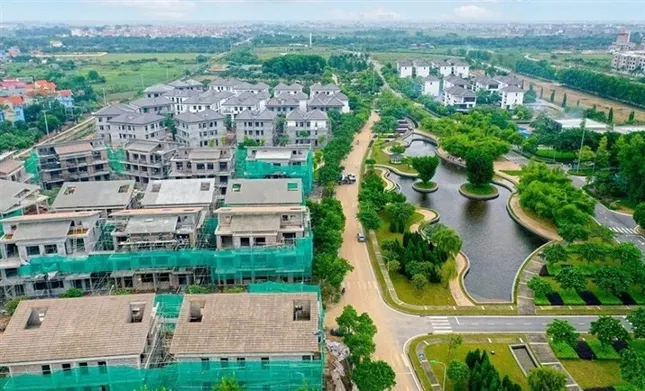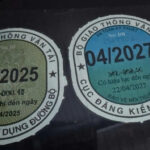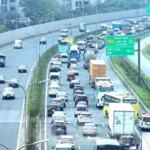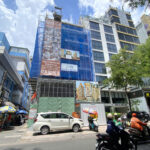Decree No. 140, issued on June 12, defines the authority of local governments in the management areas under the Ministry of Construction.
The Decree delineates the authority of local governments in two tiers in the fields of construction activities, housing and real estate business, architecture, urban development, technical infrastructure, and transportation.
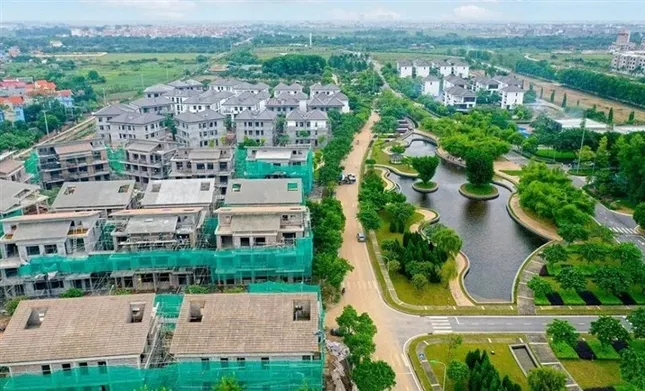
The government defines the authority in the management areas under the Ministry of Construction (Illustrative image)
According to the Decree, the authority to grant construction permits under the Law on Construction 2014 (amended and supplemented in 2020) will be carried out by the People’s Committee at the communal level.
The Decree clarifies that the responsibility for receiving registration applications for purchasing, renting, or leasing social housing from resettled persons, checking and confirming their eligibility, and compiling lists of eligible individuals and households will be handled by the People’s Committee at the communal level.
The responsibility for verifying and confirming the subjects in the application form who are named in the certificate of land use right and ownership of assets attached to the land by the district-level Land Registration Office will be carried out by the Land Registration Office/branch of the Land Registration Office located in the communal-level administrative units or inter-communal/ward areas where the social housing projects are located.
Meanwhile, the responsibility for appraisal, confirmation of subjects, housing conditions, income conditions, and eligibility for preferential loans previously held by the district-level Department of Natural Resources and Environment will now be undertaken by the communal-level People’s Committee.
The task of publicly announcing information related to social housing investment projects provided by the investors, previously performed by the district-level People’s Committee, will now be carried out by the People’s Committee at the communal level where the projects are located.
Additionally, the responsibility for organizing and enforcing compulsory measures and resolving complaints related to enforcement, previously held by the district-level People’s Committee, has been decentralized to the communal level People’s Committee.
Along with these responsibilities, the communal level also undertakes the task of managing the real estate business.
This Decree takes effect from July 1, 2025, and will remain valid until March 1, 2027, except in cases where ministries and ministerial-level agencies report to the Government and are approved by the National Assembly for an extended period of application.
The Ultimate Guide to Navigating Construction Permits: Unraveling the Local Two-Tier Government Maze
The Decree No. 140/2025/ND-CP, issued by the Government on June 12, 2025, details the tasks and authority of local governments at two levels in the field of construction management, specifically regarding building permits.
A New Proposal to Eliminate the Road Usage Fee Decal for Vehicles: A Revolutionary Suggestion by the Ministry of Construction
The Ministry of Construction has proposed an innovative solution to streamline road tax procedures and reduce costs. In a forward-thinking move, they have suggested to the Ministry of Finance the abolition of road tax stickers for vehicles, a change that could revolutionize the way road taxes are administered.
The Pain of Permit Cancellation: A Universal Woe!
The recent news of proposed changes to construction permit requirements has sparked interest among the public. While this initiative is a directive from the government and a proposal from relevant agencies, it also addresses a pressing need of the people. However, to avoid potential negative consequences, careful preparation in terms of institutional, human, and technological aspects is necessary before eliminating permit requirements.
“Proposed Toll-Free Roads for Various Vehicle Types”
The Ministry of Construction has proposed an exemption from road usage charges for vehicles that are temporarily confiscated, impounded, or suspended from circulation for a continuous period of 30 days or more. In a thoughtful gesture, vehicles serving funeral processions, such as passenger cars accompanying the hearse, flower-carrying trucks, and vehicles carrying portraits, are also included in this proposal for free road usage.

